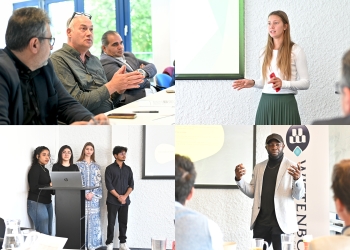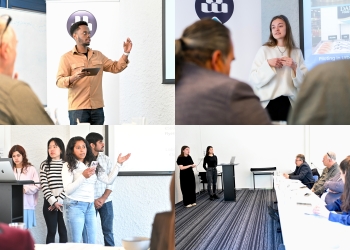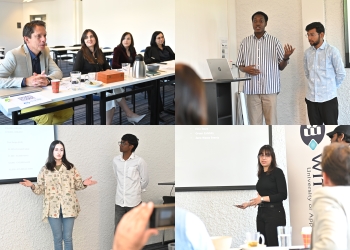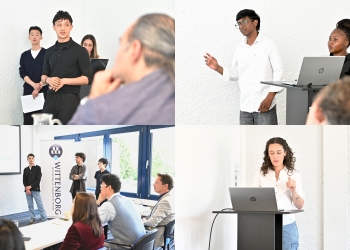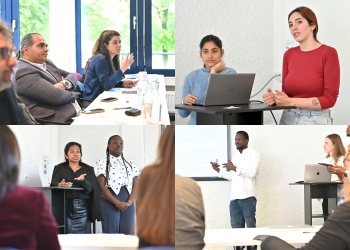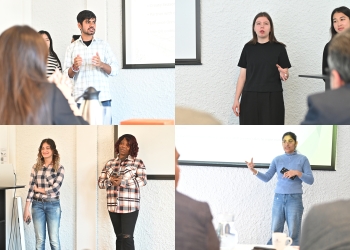BBA Students Step Up as Real Consultants Driving Digital and Green Innovation for Project Week
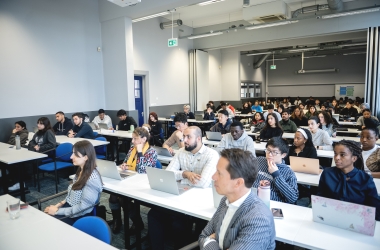
Wittenborg Students Use BusyBees Method to Solve Real Business Challenges
From 14 to 17 April, Bachelor of Business Administration (BBA) students at Wittenborg University of Applied Sciences took part in an immersive Project Week that challenged them to step beyond traditional classroom learning. Operating under the theme “Business Games: EU Twin Transition – Digital and Green Skills”, the week-long simulation encouraged students to apply their academic knowledge to real-life business scenarios focused on digital innovation and sustainability.
More than 140 students participated, collaborating with two industry partners on practical challenges. Paleis Het Loo, one of the Netherlands’ most iconic royal palaces located in Apeldoorn, tasked teams with increasing visitor engagement while reducing environmental impact. Meanwhile, Dadas Zeevis Groothandel B.V., a sustainable seafood wholesaler, invited students to design market expansion strategies that aligned with evolving regulatory standards and long-term sustainability goals.
The simulation was based on the BusyBees Business Game methodology, developed through an Erasmus+ partnership aimed at aligning higher education with the EU’s twin transition priorities – digital transformation and green innovation.
Students were expected to work as real consultants, crafting digital strategies that aligned with sustainability principles. Through the process, they developed skills in digital marketing for sustainability, CSR (corporate social responsibility) and more.
To prepare them, a team of faculty and staff played crucial roles. Vajihe Shojaei, Ali Ozdemir, Fjorentina Muco and Vanessa de Oliveira Menezes – in collaboration with academic and industry partners – delivered introductory sessions, led interactive workshops and offered one-on-one feedback throughout the week.
As Shojaei reflected: “We had the opportunity to participate in workshops focused on key themes like digital marketing for sustainability, CSR, ESG (environmental, social and governance) and the Twin Transition. These sessions helped us deepen our understanding of the latest tools, frameworks, and teaching strategies, and prepared us to pass that knowledge on to our students confidently.”
Over four days, students worked in diverse teams to build strategies tailored to their assigned company. Their final presentations – delivered on 9 May – showcased creative, well-researched and highly applicable solutions.
Erasmus+ Project Administrator & Researcher Jian Liu highlighted some of the standout ideas, such as the use of augmented reality at Paleis Het Loo to enhance the visitor experience by allowing guests to interact with historical scenes and characters via their smartphones. For the seafood group, students proposed strengthening the company’s online presence through sustainable storytelling – sharing behind-the-scenes content on eco-friendly practices, launching a unified campaign like #MadeGreen and collaborating with eco-conscious influencers.
Shojaei later emphasised the student-driven learning process: “Their solutions were not only thoughtful and innovative, but also deeply informed by ethical, environmental, and digital awareness.”
Muco echoed these sentiments: “All groups had done serious work and provided relevant ideas to the case. For some of the students this project was the last one before graduation, and I am happy that they accomplished their study journey with the sweet taste of victory.”
Meanwhile, de Oliveira Menezes engaged directly with representatives from Paleis Het Loo and noted the enthusiasm of both students and partners: “The representative expressed great enthusiasm for the ideas proposed by the students. Many of the suggestions were straightforward and cost-effective, which made them especially appealing.”
The connection to real industry challenges was one of the project’s biggest strengths. Students held Q&A sessions with company representatives, adapted to live feedback and worked within authentic constraints.
“They appreciated how clear and real-life the project was,” Shojaei said, describing students’ reactions. “Many said they loved being able to contribute to solving an actual industry problem. It wasn’t just another assignment — it was a chance to take on a real role and make a difference.”
The seafood group was particularly impressed and highlighted how creative and innovative the solutions were.
This particular Project Week also stood out because it was international in nature, taking place simultaneously in partner institutions across Europe. Shojaei explained: “This is an international project, implemented simultaneously in different countries. This global dimension enables participants to share and compare challenges, insights, and outcomes, which can significantly enrich the learning experience.”
It became clear that the train-the-trainer model – where educators first receive focused training before guiding students – worked exceptionally well. Shojaei captured the spirit of co-learning: “This wasn’t just about delivering content — it became a true co-learning experience. The students didn’t just absorb what we taught; they expanded on it, brought their own insights, and challenged us with their fresh thinking and global perspectives.”
The winners of Project Week will be publicly announced soon.
WUP 28/05/2025
by Erene Roux
©WUAS Press
